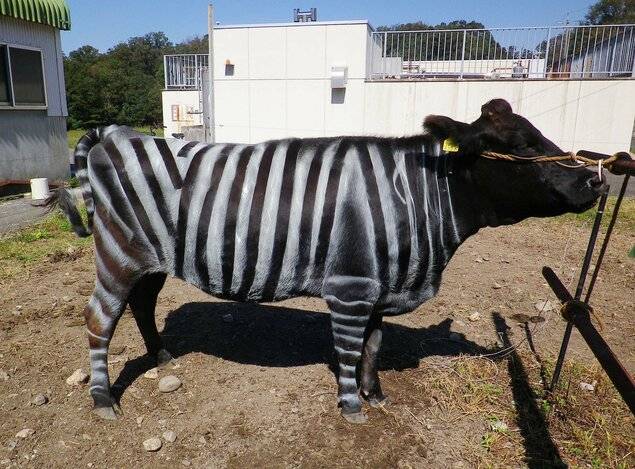Team who tried to trick flies wins Ig Nobel Prize

A group of 11 Japanese scientists won the Ig Nobel prize in biology on Thursday for their experiment showing that painting zebra-like stripes on cattle significantly reduces the number of biting flies landing on them.
The achievement, recognized at a ceremony in Boston, marks the 19th consecutive year in which at least one Japanese national has been among the winners selected by the Annals of Improbable Research, a science humor magazine that has given out the annual awards since 1991, parodying the prestigious Nobel prizes.
The magazine says the awards are meant to honor scientific breakthroughs that “first make people laugh, and then make them think.”
Ten such prizes are given each year for surprising research in varying categories, with this year’s winners also including studies on the pizza preferences of lizards and the impact of smelly shoes.
Black-white pattern
According to the Japanese study, published in 2019, applying a black-and-white pattern of stripes on cows may help reduce the economic losses associated with stinging fly attacks.
Repelling the pests leaves cows less time for grazing, feeding and bedding down as well as putting them at risk of injury, with the attendant losses for US cattle production estimated to reach $2.2 billion per year, the study said.
Using waterborne lacquers on Japanese black cows, the researchers observed a reduction in biting flies by as much as 50 percent on the animals given white stripes—creating the zebra-like pattern—as compared to those given black stripes or not painted.
The striping treatment could be an alternative to pesticides currently in use to keep flies off cattle, the research paper noted, with benefits for animal welfare, human health and the environment.
‘Deeply honored’
Prize organizers said the study, titled “Cows painted with zebra-like striping can avoid biting fly attack,” expanded on research by a team of scientists from Hungary, Spain, Sweden and Switzerland whose findings suggesting that flies land less frequently on white horses won the 2016 Ig Nobel prize in physics.
“We are deeply honored to receive this award,” said Tomoki Kojima, a team member now with the National Agricultural and Food Research Organization, at the ceremony before two other members swarmed him with biting fly props in a comedy skit.
Kojima took off his jacket to reveal a zebra-striped shirt and continued with his speech, now free of interruptions from prop flies.
Among other prizes awarded this year, the peace prize went to scientists for demonstrating that drinking can sometimes improve one’s ability to speak a foreign language, while the aviation award was given for studying whether ingesting alcohol impairs bats’ ability to fly.

















